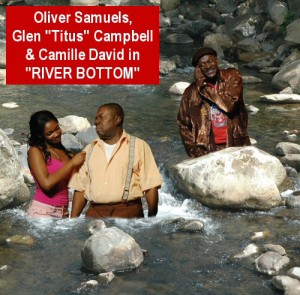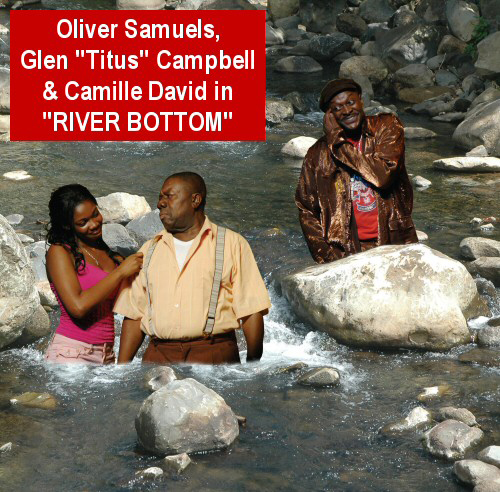The theatre of Oliver Samuels as it is today has many things to tell us about itself and its development over three decades, but it can also say quite a bit about Jamaican and Caribbean theatre over the same period.
Samuels and Paul Keens Douglas had risen to be the leaders in the region in their brand of dramatic monologue. By himself, the famous “Oliver” had earned the title of the Caribbean’s king of comedy.

Many of the theatrical elements relevant to the foregoing are rolled into a single production, the musical play River Bottom, which had already been running in Jamaica and which was taken for one weekend to Guyana’s National Cultural Centre early in June. What can be seen in this drama is a good indication of current popular trends in the theatre and the dramatic revelation that Oliver Samuels has gone full circle right back to where he began on the stage.
Oliver developed his career in the early 1970s as an actor. He took off quite rapidly when he began to appear in the annual LTM Jamaica Pantomime in which he built a reputation as a comic actor with a fair share of acclaim. In fact, such was his rise and recognition that he easily slid into a celebrated vacant post.
He became the heir apparent to the great Ranny Williams who for decades had been acting the role of the villain or rogue in the Pantomime. This was a role that the legendary Williams, popularly known As “Mas Ran” from his most famous stage character, had carved out for himself since the 1950s.
It was Williams, a Jamaican folk hero and king of comedy, who had created and led the evolution of the pantomime villain into an Anansi character. In fact, from the 1950s the character was Anansi himself, until its evolution into a variety of versions of the Jamaican ‘ginnal’ (small-time con-man or ‘smart man’). This was a rogue with Anansi characteristics and unlimited comic capacity. With the retirement of Ranny, Oliver was already waiting in the wings to try on that particular costume. He inherited the part, and performed it to the delight of multitudes for several years.
As a professional actor, as he soon became, and a theatre personality who took his career seriously, his success might have affected his place in other forms of theatre. The audience refused to see him as, or allow him to progress in serious or tragic roles. The critics deemed him uncomfortable, if not wooden, in one of his greatest lead roles in serious drama, that of the valet in Strindberg’s Miss Julie. However, that did not hang heavily around his neck for long since he had already found his niche. His place as a comedian has brought him his greatest artistic and economic success.
From the Pantomime he moved on to fame across the Caribbean as a stand-up comedian and in television sit-com. He has two hits, the best-selling Oliver and his role as a Sergeant in charge of a small-town police station with another well-known Jamaican actor, Teddy Price, as his co-star. In this medium he developed his proficiency in types of farce. This also served him in the other performance role that he perfected, that of the stand-up comic for which he is regionally famous.
Television allowed Oliver to rule the Caribbean because of its marketable and exportable properties as well as its strong element of farce which has been dominating the theatre in the region for a while. It is this element of farce that is one of the notable features of Oliver’s River Bottom.
River Bottom is a play with a very familiar design. It is set in a rural village called River Bottom and tells the story of a country boy with academic gifts who manages to make the best of an opportunity for university study overseas. He returns to the village in time to engineer its rescue from a devastating hurricane and marry his childhood sweetheart. But before all of that he has to prevail against the persistent mischief of the villain of the piece, the village pastor who is also a businessman engaged in economic activity and various forms of skulduggery on the side. The holy pastor pursues a consistent campaign to sabotage the hero because he had throughout the years, kept a lecherous eye on the hero’s romantic interest, for whom he harboured all manner of unholy secret desires.
The qualities of this comedy take us through all the motions of “the course of true love never did run smooth,” the aversion of near tragedy, eventual victory over the rogue and happy marriage in the end.
However, in its design, the drama wants to leave its audience with some social commentary and an inspiring, uplifting moral message that must remain after the laughter, the very generous, considerable laughter, has faded away.
The most important overall design of this play is that it models itself upon the Pantomime. It is a musical with choric songs, meticulous choreography and a keen sense of audience. Samuels, of course, plays the villain, the very role through which he shaped his earliest career as an actor. In River Bottom, the pastor, who is also the lead character, is well placed to narrate the story as the drama progresses and this allows Samuels to take advantage of a number of elements of pantomime, comic monologue, the stand-up comedy routine and direct engagement of his audience.
He borrows a lot from the pantomime including the ‘talk back’ to the audience which he has developed into a special art. Particular portions of the performance are fitted in during which the artful Oliver departs from the script or plot and engages the audience in repartée. This is one of the more popular features of Oliver’s theatre.
Another is the particular style of farce. This dominates the acting style and the modes of delivery adopted by the actors. All opportunities for humour are exploited. Even the main LTM Jamaica Pantomime that Samuels has appropriated has long gone this way. A very noticeable characteristic in the pantomimes of the most recent years is the very carefully crafted and choreographed movement (staged by no less than the Honourable Rex Nettleford) performed with signal discipline paradoxically alongside the most blatant deliberate farce. Farce now dominates the pantomime in a way it had not up to some time in the 1990s.
And this is one of the hallmarks of Oliver theatre seen in River Bottom. It is a significant factor because of contemporary audience orientation. Oliver, of course, plays to it because of audience demand and expectation. That is why it is a significant element not only in Samuels’ performances, but in the contemporary theatre of the Caribbean. It dominates the ‘Dance Hall’ theatre in Jamaica, as it does most of the popular theatre there, hilarious plays which travel to several venues in urban and rural centres around the country.
Farce is the main ingredient in the leading popular theatre that established itself several years ago in Barbados. Laff it Off was created by Thom Cross and has continued annually under the direction, variously, of Cross, Cecily Spencer Cross and Marcia Burrowes and produced by Cross Caribbean Theatre. It is the standard annual satirical revue with a very strong emphasis on political satire and commentary. However, it is dominated by the characteristic farcical qualities that have given it consistent sold-out houses for years running.
In Trinidad Raymond Choo Kong Productions rose to prominent success with its series of bedroom and racy farces. This has persisted in that country even outside of Choo Kong and is now the main fare in the offerings at the Central Bank Auditorium in downtown Port-of-Spain. The very fast-moving farces, mainly imported plays, now dominate and enjoy solid audience support.
It has been a trend across the main theatre centres of the Caribbean and has attracted as much criticism as it has wide popular audience support. The theatre of Oliver Samuels is at the same time an illustration of it, a generator of the demand for it, and very happily in the heights of overwhelming box office gains, designed to satisfy the demand it has helped to create.





